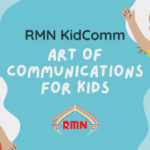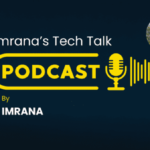
KidComm – Communications and the Application of Language
In continuation to our RMN KidComm program…
Although language is an important component of a complete communication framework, bare language is like a body without limbs.
In today’s information-driven world, the communications field has evolved significantly because all types of interpersonal and business relationships are greatly dependent on the construction and delivery of your communications.
A student may be acquiring some basic language skills in schools, but they are not being taught the application of language. Most schools and teachers are not fully trained to teach the application of language because this subject is evolving constantly while teachers are used to the traditional, static methods of teaching.
Therefore, extending the scope of our communication pedagogy model KidComm, we have identified six major components that are inevitable for any student to gain full knowledge of the emerging field of communications.
This course aims to empower students as well teachers with the enhanced knowledge of communications and the right application of language.
Here are the six different areas under our RMN KidComm program that you must learn if you want to leverage the power of communications to achieve your career or professional goals.
1. Knowledge
Even when you have a complete command over the language, you will not be able to construct your communications effectively if you don’t have the knowledge of the subject about which you have to write. In other words, the domain knowledge gives the necessary strength to your content and communications.
2. Expression
Expression is used to decorate your language. Expression is particularly important today when content consumers are facing an information overload from multiple traditional and digital media channels. A right blend of language and expression can help you develop engaging content to attract your target audience.
3. Language
Language is important – extremely important – for developing all forms of communications. However, it’s not the simple language that you know and understand. Rather, depending on the subject on which you want to write, language must take the form of simplified parlance to convey the message correctly. Similarly, your words must carry the right connotation instead of simple meaning of those words. Plus, there are dozens of other language rules that you need to follow for developing your communications.
4. Scope
When you are trying to learn the subject of communications, you must learn about reading, writing, speaking, debating, and listening. Plus, the subject comprises casual, social, business, and creative communications involving one-to-one and one-to-many variants.
5. Content
After learning and using the four communication areas described above, you can create your content for specific applications. The content can be your answers to questions in an examination, your application applying for a leave, an article for a newspaper or a website, a story for a novel, text for an ad, a film script, or simply an e-mail to a friend. Content creation is a highly specialized profession.
6. Delivery
The content and communications that you create are supposed to be delivered to your target audience. You can use traditional and digital media for content delivery depending on the type of your consumers. And the communication rules for delivery will be different for different mediums that you choose.
These are the six components that we intend to cover in detail under our KidComm program.
The KidComm methodology is developed by the RMN Company’s CEO, Rakesh Raman, who is an award-winning journalist, writer, and modern communications expert.
Schools, teachers, parents, and students may please contact us and let us know your requirement for using our KidComm program. Also, please leave your mobile phone number in your message and the convenient time at which we could contact you back.
Thank You
Contact
Rakesh Raman
Editor, RMN News Service [ Website ]
Founder, RMN Foundation [ Website ]
463, DPS Apts., Plot No. 16, Sector 4
Dwarka, Phase I, New Delhi 110 078, India
Mobile: 9810319059 | Contact by Email













